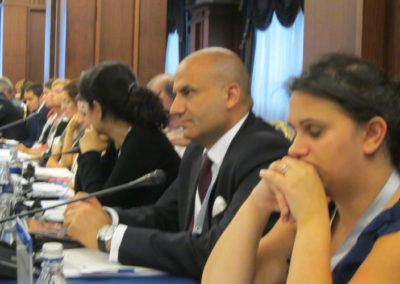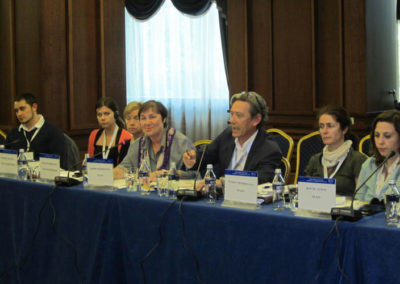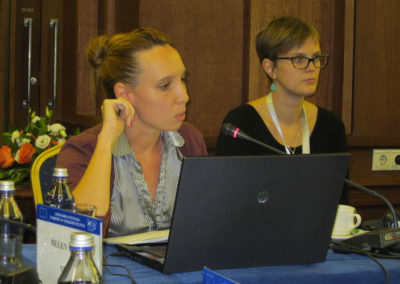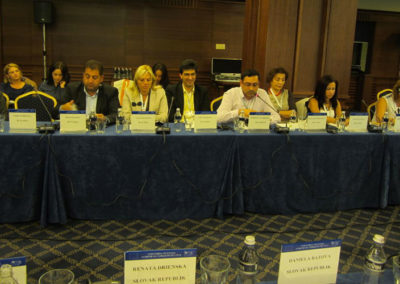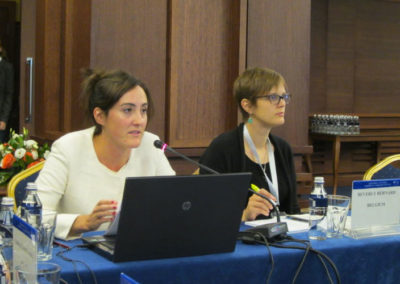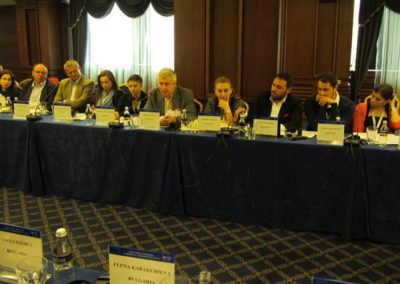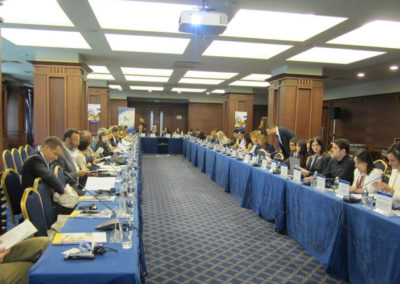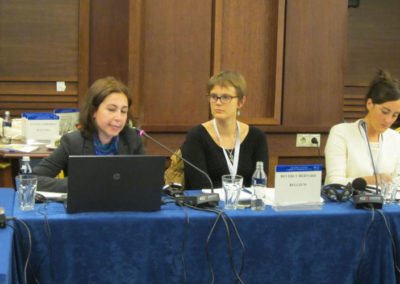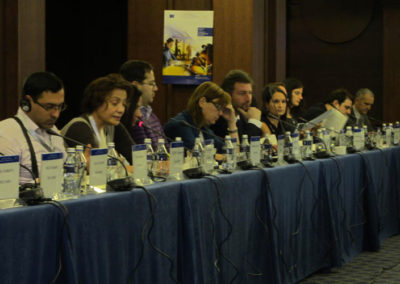The EURoma Network held its annual meeting on 19 and 20 September in Sofia, hosted by the Bulgarian partners of the Network. How to build effective partnerships for Roma inclusion under the Structural Funds was the core issue.
The EURoma Network held its annual meeting on 19th-20th September in the city of Sofia, hosted by the Bulgarian partners of the Network. How to build effective partnerships for Roma inclusion under the Structural Funds was the core issue addressed at this day and a half meeting that gathered 58 participants representing a wide variety of stakeholders: EURoma partners (representatives from Structural Funds Managing Authorities and National Roma Contact Points) from the 12 Member States currently involved in the Network, plus Belgium, Croatia, Switzerland and Turkey, European Commission representatives (DG Employment, Social Affairs and Inclusion) and the Technical Secretariat (see meeting’s agenda and list of participants).
The meeting also counted on the participation of representatives from a number of initiatives, which had the opportunity to contribute to the debate and share with members of the Network their experience during the previous programming periods and with the aim of putting forward recommendations for the 2014-2020 programming period of the Structural Funds: Health and Social Development Foundation (BG), Center for Interethnic Dialogue and Tolerance “Amalipe” (BG), Roma Education Fund (RO), IQ Roma Servis (CZ), Hungarian Maltese Charity Service (HU), Fundación Secretariado Gitano (SP), Resource Center for Roma Communities (RO), Glasgow City Council from the ROMANET, the Mayors Making the Most (MERI) Initiative, the Municipality of Kavarna (BG) and the Municipality of Vidin (BG), the Fundamental Rights Agency, the United Nations Development Programme (UNDP) and the Equal Treatment Authority from Hungary.
Setting the scene: partnership in the context of Structural Funds
In accordance with Articles 5.1 and 5.2 of the proposed Common Provisions Regulation (CPR) for the European Structural and Investment Funds, each Member State should organise for the Partnership Agreement and for each Operational Programme respectively a partnership with representatives of competent regional, local, urban and other public authorities, economic and social partners, and bodies representing civil society, including environmental partners, non-governmental organisations, and bodies responsible for promoting equality and non-discrimination.
Article 5.3 of the CPR entrusts the Commission to adopt delegated acts providing for a code of conduct to make sure that partners are involved in a consistent manner in the planning, implementation, monitoring and evaluation of Partnership Contracts and Operational Programmes.
The European Commission is working on the elaboration of the European Code of Conduct on Partnership (ECCP) for the European Structural and Investment Funds that provides the framework for the participation of different stakeholders in the Partnership Agreements as well as in the use of Structural Funds at national, regional and local levels; at the same time, Member States are working on the elaboration of their respective Partnership Agreements and deciding who should be involved in the different phases of the OPs of the future programming period, to what extent and how. In this context, EURoma considers that we are at a critical moment to review the recent developments of the Partnership Agreements and take this opportunity to reflect on how the ECCP can support more efficient partnerships for Roma inclusion under Structural Funds. In fact, the -second version of- the Delegated Act (June 2013) highlights that specific attention should be paid to groups that might be affected by the programmes but find it difficult to influence them, – and explicitly refers to Roma among other vulnerable groups.
Furthermore, partnership has been a key issue in the previous and current programming periods of Structural Funds for members of EURoma, as it was highlighted in several meetings of the Network. In fact, EURoma members have drawn attention to the difficulties encountered in building effective partnerships and more specifically in building partnerships for Roma inclusion on several occasions.
For this reason this meeting was intended to provide members of the Network the opportunity to debate and exchange opinions based on the experience and lessons learned of relevant stakeholders that have been previously involved in the use of Structural Funds. It was an excellent opportunity to review the different roles and analyse diverse models of partnerships, reflecting on their respective advantages and disadvantages, the required conditions for the establishment of efficient partnerships, etc. in order to contribute to the planning and implementation of the upcoming Partnership Agreements and Operational Programmes.
The meeting of EURoma therefore addressed primarily the issue of partnerships: the new opportunities opened by the European Code of Conduct on Partnership and lessons learned thanks to the contributions and experience of relevant actors during the previous and current programming period with a view to supporting better planning, implementation and monitoring for Roma inclusion in the next programming period.
Welcoming Words
Ms. Rositsa Yankova, Deputy Minister from the Ministry of Employment and Social Policy, and Mr. Ivan Krastev, Deputy Minister of Science and Education, were in charge of welcoming participants and opening the working sessions? They also provided an overview of the Bulgarian context and the main policies towards the social inclusion of the Roma population in the country
Preparing the new programming period 2014-2020
Recent developments on Partnership Agreements: How can the European Code of Conduct on Partnership for the European Structural and Investment Funds support more efficient partnerships for Roma inclusion?
Ms. Teresa Epalza from the European Commission presented the current framework at European level, the new opportunities in the upcoming period according to the provisional Delegated Act on the European Code of Conduct on Partnership (EECP) for the next programming period 2014-2020 according to the EC draft Regulations and the state of the negotiations. She also explained the process of elaboration of the Code of Conduct, a process that will be closed by the end of the year, and how different stakeholders have been involved at EU level.
As pointed out in the ECCP, the partnership principle has been for a long time one of the key values for managing the European Funds. Partners such as regional and local authorities, economic and social partners, and the wide range of organisations representing civil society should be involved throughout the whole programme cycle (planning, implementation, monitoring and evaluation) of the EU Structural and Investment Funds.
The Code looks at the potential range of partners that should be selected and proposes that each country identifies, according to the national context, the relevant stakeholders, the incentives and the legal and administrative obstacles to partnership as well as possible ways to address them.
The Commission also suggests in this document approaches to involve the partners in the different stages of the Funds’ management, including in monitoring committees, the selection of concrete projects and the evaluation of programmes, etc. Best practice examples were provided to showcase successful partnerships established in several countries in the current and previous programming periods.
How do national governments foresee the development of the European Code of Conduct on Partnership for the European Structural and Investment Funds for Roma inclusion in the next programming period?
European Commission’s presentation was followed by a round of interventions in which participants shared how participating Member States are approaching the partnership agreements and to what extent and in which conditions the different stakeholders in their countries are participating in the preparation of the next programming period.
Contributions highlighted that there is commitment and political will to increase the level of partnership in Member States building upon the ECCP. Nevertheless there are issues that would require further reflection including:
- How Member States can progress from consultation, the most common model of participation, to effective partnerships throughout the process of design, implementation and evaluation of Structural Funds.
- The quality of the partnerships: effective partnerships, not only related to Structural Funds but also to the EU2020 Strategy, require adequate structures, establishing a calendar, requesting feedback, interactive consultation and participation all over the process.
- Identification of adequate partners: even though there is no one perfect model, each country should try to identify models that allow the selection of adequate partners to be involved in the formal consultations.
- Institutional capacity: providing feedback to Operational Programmes is a complicated topic. If real and mature partnership is truly desired, there is a need to invest in capacity building, for example through technical assistance, in order to support the quality of participation and partnerships.
How to involve stakeholders for Roma inclusion under the ECCP:
Taking advantage of the lessons learned in the previous and current programming periods: presentation of different experiences and models of partnerships in the use of Structural Funds for Roma inclusion to feed the debate among partners.
Partnership has been an issue of particular relevance for EURoma members in the previous and current programming periods of Structural Funds, as proven by the fact that it was several times addressed in previous Network meetings, especially the difficulties encountered in building effective partnerships for Roma inclusion. In Sofia, members of EURoma had the opportunity to listen to the experience and proposals from diverse stakeholders in previous programming periods.
It is widely recognized that partnership is an added value in itself and can bring many benefits, ranging from enhanced commitment and broader expertise to better transparency and better-quality of the policy-making process. Nevertheless, experience shows that there are wide differences across the EU as regards the application of the principle of partnership. Moreover, the effectiveness of the partnership principle in the different countries also relies on the technical capacity of the partners to contribute to the process, raising the question of capacity-building.
In order to take full advantage of the contributions of different stakeholders, three roundtables were organized and external stakeholders with experience in the areas covered were invited to each of them:
- Roma involvement in the use of SF for Roma inclusion
- Local authorities´ involvement in the use of Structural Funds for Roma inclusion under the ECCP.
- Other Stakeholders included in the European Code of Conduct on Partnership (universities, equality bodies, international organisations, etc.).
In the first roundtable Roma representatives and NGOs working for the promotion for the Roma population in different countries shared with participants their experience of participation in the different phases of the previous programming periods operational programmes: consultations for designing OP, implementation of Structural Funds targeting marginalized communities or Roma specifically, mainly as beneficiaries but also as intermediate bodies and as members of monitoring committees.
Invited participants included: Ms. Elena Kabakchieva from the Health and Social Development Foundation (BG), Mr. Deyan Kolev representing the Center for Interethnic Dialogue and Tolerance “Amalipe” (BG), Mr. Danut Dumitru from the Roma Education Fund (RO), Ms. Lenka Malerova representing IQ Roma Servis (CZ), Mr. Laszlo Moravcsik from the Hungarian Charity Service of the Order of Malta (HU), Mr. Isidro Rodriguez representing the Fundación Secretariado Gitano (SP) and Mr. Marin Gheorghe coming from the Resource Center for Roma Communities (RO).
The second roundtable built upon experiences related to the management of Structural Funds at local level to promote the social inclusion of Roma. Ms. Marie McLelland, representative of Glasgow City Council, presented the experience of Glasgow as well as the know-how acquired in the context of the initiative MATRIX and the framework project ROMANET; Ms. Savelina Roussinova from the Open Society Foundation, introduced the experience of several local authorities gathered within the initiative Mayors Making the Most of EU Funds for Roma –MERI. They both highlighted the importance of the role that local/regional authorities can play supporting local Roma leaders and NGO, that it is not only a matter of capacity building but also of establishing the proper structures, promoting greater involvement of public authorities and adequate financial and technical assistance, among other. Participants also pointed out the importance of counting on support for the local authorities, at different levels, to build their capacity (institutional/technical/financial capacity, knowledge in terms of social inclusion issues, non-discrimination, etc.) to absorb EU Funds at local level and in order to increase the impact of these instruments towards the social inclusion of Roma at local level.
Last round table of the day gathered other stakeholders, already included in the European Code of Conduct on Partnership as universities, equality bodies, international organizations, etc., that highlighted which is the added value of their participation in the Structural Funds for the upcoming programming period and how was their experience in the previous programming periods. For this part, representatives from the Fundamental Rights Agency: Mr. Andrey Ivanov, Mr. Jaroslav Kling from UNDP and Ms. Erna Csókas from the Hungarian Equal Treatment Body presented their view point and exchange opinions with members of EURoma on how different bodies could contribute to the more effective use of SF towards Roma inclusion for the next programming period 2014-2020. In fact several issues were emphasized as for example the need of reliable data and that national statistical agencies are not yet providing figures or tools to follow up on the use of SF for social inclusion of marginalized communities, the complicated and bureaucratic process that is the participation in SF keeps good and relevant stakeholders out of using this key tool for the social inclusion of Roma in many countries, etc.
Each of this roundtables were followed by feedback from member states in order to assess how the participation of the abovementioned stakeholders (NGOS, local authorities and other stakeholders) were developed in the previous programming periods and they reflected as well on how to improve their involvement in the upcoming periods. Not only because the ECCP indicates that partnerships are mandatory but because all MS recognise that good partnerships are key to the success of the implementation of Structural Funds for the social inclusion of Roma population.
Member States agreed that countries are already aware about the importance of engaging key stakeholders throughout the process of designing, implementing, following up and evaluating the use of Structural Funds; but when analysing each case difficulties are encounter when choosing the right partners, establishing structured dialogue, implementing coordination mechanisms, the need to invest in capacity building for a proper participation, among other.
It was also pointed out that two years ago everybody welcomed the National Strategies for Roma Inclusion and now everybody is aware of the pre-conditionality for social inclusion success that local authorities are engaged. Despite this common knowledge, very few countries have invited them to participate in the first phase of the designing of the upcoming Operational Programmes that could support NRIS. If proper measures are not included these key actor will be far away from the process.
The second day
The second day of the meeting was mainly devoted to the country monograph which included a presentation of the current measures addressed to Roma minority in the country under the existing operational programme Human Rights Development of the Structural Funds. This presentation was delivered by Mr. Roberto Marinov (DG EFIPP; OP HRD – Ministry of Labour and Social Policy), followed by the foreseen measures for the next programming period from the Ministry of Regional Development and Public Work, Ms. Evelina Stoyanova and Mr. Stoyan Tsonev from the Ministry of Education. Giving all participants the opportunity to know how Bulgaria foresees the implementation of targeted and integrated measures, coordination mechanisms between different ministries, combination of funds, etc. for the social inclusion of Roma with the support of Structural Funds.
Following the above mentioned presentations, Ms. Rositsa Ivanova, from the Secretary of the National Council for Cooperation on Ethnic and Demographic Issues, from the Council of Ministers provided a detail presentation on the current implementation of the Bulgarian Roma Integration Strategy.
In order to have a clearer picture of the Bulgarian Roma situation, Mr. Andrey Ivanov delivered the main findings of the Bulgarian chapter of the study carried out by the Fundamental Rights Agency in 5 countries with large Roma population in 2011.
The national chapter of this meeting was closed by presentations from two recognised as good practices for Roma inclusion experiences: the municipality of Kavarna (Ms. Galya Ivanova and Ms. Milen Bashev) and the municipality of Vidin (Ms. Borislava Borisova and Ms. Tonika Decheva) and the relevant NGO Health and Social Development Foundation presenting integrated approaches at local level that was represented by Ms. Elena Kabakchieva.
Closing Session
Final words were delivered by the Head of the Bulgarian ESF Managing Authority, Ms. Natalia Efremova, who thanked all participants for a productive meeting and gave all members of the network a warm farewell.
RELATED DOCUMENTS
- Agenda
- The European Code of Conduct on Partnership
- Health and Social Center for Community Development
- Amalipe
- The Hungarian Charity Service of the order of Malta
- IQ Roma Servis
- Equality Body Hungary
- Country Monograph
- 2014-2020 Operational Programme
- NRIS
- Fundamental Rights Agency (FRA) Study
- Municipality of Kavarna
- Integrated approach in Kavarna
- Municipality of Vidin

